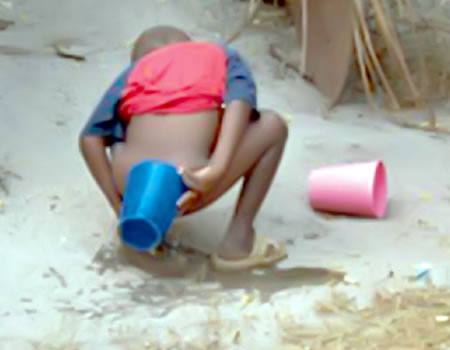DESPITE being a community leader, building a toilet wasn’t a priority because there is an option of going in the open. The turnaround was when his children in higher institutions stopped coming frequently to spend the weekend, and the wife died from an injury she sustained from a fall. A commercial motorcycle ran into her while out to throw away faeces packed in a polythene bag.
“He should be a vanguard for clean toilets and to construct one. He refused, claiming that open defecation is not new in his community, having been openly defecating for over 50 years and asking why it is necessary to build a toilet for his family,” recounted Dr Ebunoluwa Adeoye, the Coordinator for Neglected Tropical Diseases (NTDs) at the Oyo State Ministry of Health.
“The turning point was when he was made to realise that his children in higher institutions wouldn’t be free to come with their friends on holidays because there is no clean toilet; and see why it contributed to the death of one of his wives,” she added.

Dr Adeoye spoke on the sidelines of a two-day media dialogue with the theme ‘Ending Open Defecation in Nigeria and Elimination of Neglected Tropical Diseases (NTDs), held in Lagos. It was organised by the Oyo Rural Water Supply and Sanitation Agency in collaboration with the United Nations Children’s Fund (UNICEF).
The latest report by WASH National Routine Mapping (WASHNORM) showed that 47 million people in Nigeria practice open defecation, with only 18 percent of Nigerians (37 million people) having access to safely managed sanitation services.
Ebonyi State leads in open defecation, followed by Plateau State, while Zamfara State is the lowest with one percent. Oyo State is ranked fourth in states with open defecation.
Interestingly, open defecation also occurs in highbrow places like Lekki. Mrs Oyetola Oduyemi, the senior director, Investor Relations and Sustainability, The End Fund, recounted witnessing a bread seller cleaning up for her daughter after defecating on a nylon bag and continuing her sales.

“When she was done, though obviously there was no tissue the mother takes a pure water sachet, rips it with her teeth, and washes the girl’s bum. The girl goes off. Then the woman finishes, and there’s somebody waiting to buy bread. She picks a loaf, dusts it, and hands it over,” she declared.
According to Mrs Oduyemi, the buyer and eater of the bread could be anybody, and such contaminated foods expose them to the danger of infections, including neglected tropical diseases (NTDs).
“So, we are talking about over 165 million Nigerians that are in need of treatment for one or more of these neglected tropical diseases as a consequence of open defecation,” she added.
NTDs are a group of infections that affect the world’s poorest populations, causing long-term disabilities and, in some cases, death. The diseases, including Onchocerciasis, Schistosomiasis, Trachoma, Lymphatic Filariasis, and Soil Transmitted Helminthiasis (STH), thrive in areas where there is a lack of clean water and proper sanitation facilities.
These conditions, transmitted through contaminated soil and faeces, perpetuate a cycle of poverty, malnutrition, and ill health that remain prevalent in several parts of Nigeria.
Unfortunately, Nigeria has the largest NTD burden in Africa, with more than 200 million people. According to UNICEF WASH Specialist, South-West Zone, Mr Monday Johnson, Nigeria is endemic for all NTDs, which are targets of the USAID’s Act to End Neglected Tropical Diseases programme.
These are lymphatic filariasis, river blindness, schistosomiasis, trachoma, and soil-transmitted helminthiasis (STH).
Across Nigeria, only a few are aware of the devastating impact of open defecation on the transmission of these neglected tropical diseases.
The Baale of Alagba Village at Ona Ara Local Government Ibadan, Babalola Abidemi, said his village has made progress in addressing lack of toilets but still has many villagers yet to be convinced to adapt use of toilets.
“The practice of open defecation is a deeply ingrained cultural habit that poses significant health risks to the community. Before we started a year ago, we had contaminated water sources and increased transmission of diseases like cholera and typhoid, but they are now reduced with our new arrangement with some banks,” Baale Abidemi declared.
Despite these realities, Mr Johnson declared that open defection and NTDs are a deadly duo that must be tackled.
According to him, “By addressing open defecation, we can significantly reduce the transmission of NTDs; and improved sanitation and hygiene practices can break the cycle of infection, protecting vulnerable populations, especially children and women.
“NTDs are a proxy for poverty, which prevails among vulnerable and marginalised populations. NTDs and poor access to WASH contribute to a vicious cycle of poverty and disease. NTDs can lead to catastrophic health expenditure.
“If there is no faeces that is left in the environment, there will not be any issue of these soil-transmitted diseases. People pick them up; they ingest them because faeces are around the environment.
“For a disease like schistosomasis, which is found where you see children passing blood in their urine, the disease is basically a waterborne disease. The transmission occurs when an infected person urinates in the water, and then the saccharia passes through the snail; it is shed into the river and enters through the skin of its victim.”
Mr Johnson said issues around NTDs are all behavioural, and eliminating them requires stopping open defecation.
“Changing those behaviours, communities, households, constructing latrines, and making them safe for people to use at home will increase dignity among men and women, especially young girls. This will decrease the rate at which we have diarrhoea in children because either the flies have taken the pathogen from wherever to the food that we are eating. It will also have a corresponding effect on the elimination of NTDs, currently being tackled by different drugs.”
The Deputy Director, ‘Clean Nigeria: Use the Toilet’ Campaign, Federal Ministry of Water Resources and Sanitation, Mrs. Chizoma Opara, underscored the urgent need for increased investment in sanitation facilities and a stronger commitment from the government to address these challenges effectively.
The Chief of Water, Sanitation, and Hygiene [WASH], UNICEF Nigeria, Jane Bevan, maintained that open defecation must be stopped because it’s killing many children and people are dying unnecessarily despite simple preventative measures like use of the toilet and washing our hands that really make a huge difference.
Bevan declared that hand washing is probably the most cost-effective immunisation to prevent some of these diseases and save lives.
Without clean water and soap, it is difficult to implement simple and effective public health actions that can prevent and manage debilitating NTDs: face-washing for trachoma, a disease that leads to painful, irreversible blindness; limb-washing for lymphatic filariasis (elephantiasis), in which worms invade the lymph system and cause severe oedema, especially of the legs; and hand-washing for intestinal worms, whose eggs are ingested with food inappropriately manipulated and contaminated with soil.
“UNICEF is working very closely with the government and with the Clean Nigeria campaign to really make a difference. We’re working in several states. We’ve already managed to achieve 126 open defecation-free LGAs in the country, and there’s many more that will now be coming up,” she stated.
However, Mrs. Chizoma Opara stated that the ongoing “Clean Nigeria: Use the Toilet Campaign” is because of the enormity of the cost of open defecation and that Nigeria is on track to be open defecation-free by 2030.
“As a result of open defecation, a whole lot of children are out of school; a child that has cholera or any of these diseases, as a result of open defecation ends up in the hospital. The roadmap to end open defecation in Nigeria by 2025 brought out the fact that Nigeria needs about N900 billion to end open defecation.”
Also speaking, UNICEF’s communication officer, Blessing Ejiofor, urged the media to raise awareness about the dangers of open defecation and the need to end this practice, emphasising that addressing sanitation is crucial for achieving broader health goals in Nigeria.







